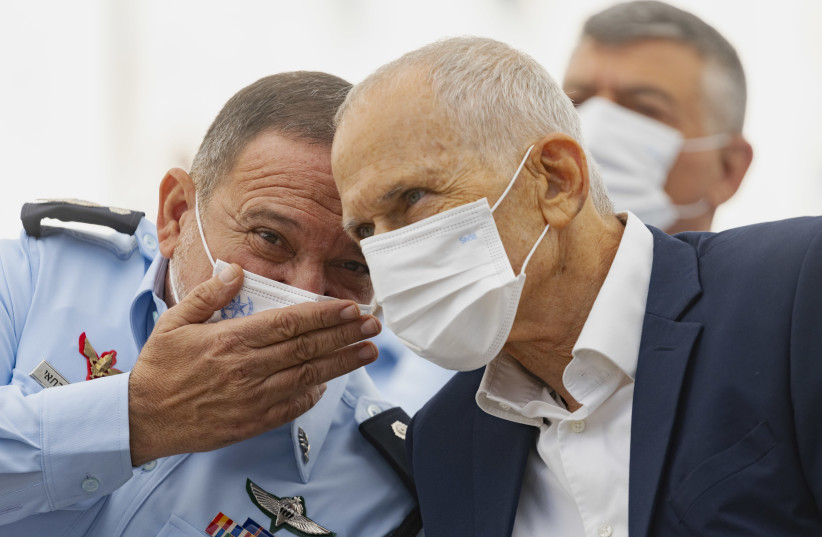It stinks. The alleged phishing of innocent citizens’ smartphones, as reported Monday in the financial daily Calcalist, suggests we have arrived at the brink of an Orwellian abyss.
For uniformed officials to spy on private citizens with neither judicial warrant nor criminal suspicion takes not only a few perpetrators’ audacity, conceit and moral bankruptcy, but also their employer’s institutional decay.
That is why Israel Police must undergo an administrative overhaul regardless of the facts behind the scandal that shook the Jewish state this week.
POLITICAL IMAGINATIONS worked overtime as people wondered what happened within Israel Police’s intelligence operation.
Were police techies out to serve the previous government’s political needs? Is that why they reportedly targeted social activists who organized street demonstrations?

Well that thesis does not explain why police would phish the smartphones of civil servants like the former directors of the Finance, Justice and Transportation ministries. Were they also planning street rallies?
Some suggested the idea was to find through the civil servants’ telephones who was leaking stories to the media. But what could these unelected and non-political figures possibly leak that might bother the police? That’s besides the fact this threesome’s jobs allowed them to talk to the press without anyone’s authorization, least of all police.
Others suggested the eavesdropping was designed not to serve, but to undermine Benjamin Netanyahu. That might have explained the wiretapping of officials related to Bezeq, which is involved in one of Netanyahu’s indictments.
Well if so, why wiretap anti-Netanyahu activists who demonstrated outside his residence until his defeat last year?
The eavesdroppers’ political inconsistency is indeed mind-boggling, and also defeats Netanyahu’s attempt to link the scandal to his own legal situation. What police did here was not about him or indeed about any other single individual. It was about all of us.
This is besides the fact that two of Netanyahu’s indictments are not about wiretapping at all. The illegal-gifts case is based on the testimony of Hollywood mogul Arnon Milchan’s aide Hadas Klein, and the allegation concerning a deal with Yediot Aharonot publisher Arnon Mozes is based on Netanyahu aide Ari Harow’s unsolicited recordings.
So no, this affair is not about police partiality or politicization. It is about deep ailments that have been fermenting for decades and require open-heart surgery.
ISRAEL POLICE’S decadence surfaced in all its severity in 2015, when seven of the 15 commissioners who constituted its high command became suspects in assorted improprieties. Five of them, including a former deputy commissioner, faced revelations of sex offenses against female subordinates.
This was the backdrop against which Netanyahu, rightly, retrieved Roni Alsheich from the Shin Bet and imposed him on Israel Police.
Alsheich brought a new spirit of professionalism and reform, but the organization’s overall delivery remained intolerably under-par, culminating in two major catastrophes: last summer’s Mount Meron disaster, where 45 people died in Israel’s worst-ever crowd-control failure, and last spring’s statewide Israeli-Arab riots, which caught police unprepared for the 10-day violence in which citizens were mobbed, synagogues were torched and more than 300 cops were injured.
More routinely, the police have been ineffective in the face of rampant violence in the Arab sector, which last year alone saw 126 murder cases, most of them unsolved. Less dramatically, but even more routinely and hopelessly, burglaries, robberies, assaults, car thefts and harrowing traffic violations go unpunished every day, making thousands feel that Israel Police is lethargic and unreliable. A recent poll conducted by the Israel Democracy Institute indicated that only 29% of Israelis trust Israel Police.
This, in brief, is the organization that now is suspected of having spied on a host of innocent citizens, including not only civil servants and social activists but also mayors, journalists and Netanyahu’s son Avner.
Whatever ultimately turns out on this particular front, Israel Police is clearly an unfocused organization with too many tasks.
No police force in the world is assigned with fighting burglars, thieves and robbers in the morning, political corruption at noon, organized crime in the afternoon, nationalist rioting come dusk and, in between all these also fights drug dealers, reckless drivers, pickpockets and pimps.
The cops who allegedly abused the Pegasus technology with which they were meant to fight terrorism and organized crime, could get away with that because they were part of an overtasked, omnipresent and disoriented organization that has become impossible to supervise.
The remedy for this overgrowth is that Israel Police be broken up into separate organizations, the way AT&T was 40 years ago.
IN THE redesigned police, metropolitan policing will be shifted to the municipalities, each of which will have its own police department answering to the mayor, who will also appoint its commander, as American mayors do.
Municipal police will be in charge of street safety, burglaries, theft, prostitution, drug-dealing, protection rackets, illegal gambling and every other crime that happens in its town and targets its population. This police force’s delivery will be judged by the voters in every mayoral election.
A separate, national organization, based on what now is Israel Police’s Lahav 433, will fight organized crime, financial fraud and political corruption, the way the FBI does in the US.
The existing Traffic Police and Border Police will be similarly spun off. The Traffic Police will also lead the fight on car thieves, and the Border Police will be redefined as the national riot police, securing all big events, from soccer games to religious pilgrimages.
Lastly, as suggested here recently in a different context (“This can’t go on,” November 19, 2021), an independent rural police will fight agricultural theft and also raid illegal drug farms.
Organized this way, police will be more focused, professional, dedicated, moral, humble and law-abiding, too.
The writer’s bestselling Mitzad Ha’ivelet Ha’yehudi (The Jewish March of Folly, Yediot Sefarim, 2019), is a revisionist history of the Jewish people’s leadership from antiquity to modernity.
